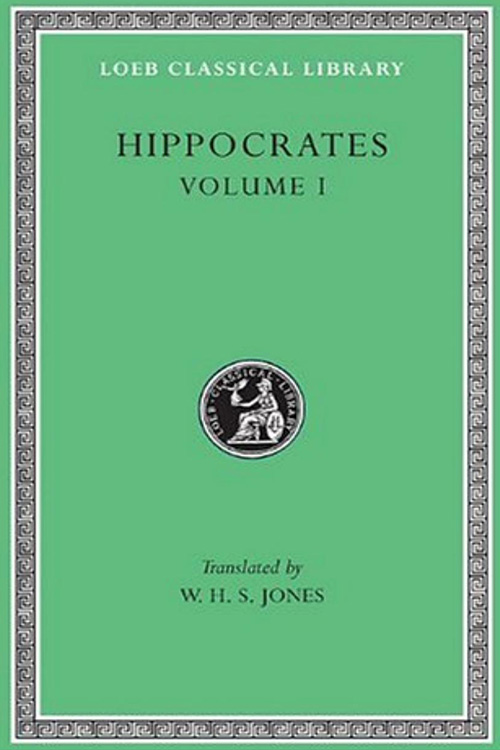Text summary
From: Book · Hippocrates · 1923

Full Translation, Collation (partial)
Ancient Greek ⟶ English a
| Line | Greek | English Translation |
|---|---|---|
| pp. 298-301 | ||
| "The Oath" | ||
| 1-9 | Ὄμνυμι Ἀπόλλωνα ἰητρὸν καὶ Ἀσκληπιὸν καὶ Ὑγείαν καὶ Πανάκειαν καὶ θεοὺς πάντας τε καὶ πάσας, ἵστορας ποιεύμενος, ἐπιτελέα ποιήσειν κατὰ δύναμιν καὶ κρίσιν ἐμὴν ὅρκον τόνδε καὶ συγγραφὴν τήνδε· ἡγήσεσθαι μὲν τὸν διδάξαντά με τὴν τέχνην ταύτην ἴσα γενέτῃσιν ἐμοῖς, καὶ βίου κοινώσεσθαι, καὶ χρεῶν χρηΐζοντι μετάδοσιν ποιήσεσθαι, καὶ γένος τὸ ἐξ αὐτοῦ ἀδελφοῖς ἴσον ἐπικρινεῖν | I swear by Apollo Physician, by Asclepius, by Health, by Panacea and by all the gods and goddesses, making them my witnesses, that I will carry out, according to my ability and judgment, this oath and this indenture. To hold my teacher in this art equal to my own parents; to make him partner in my livelihood; when he is in need of money to share mine with him; to consider his family as my own brothers, and to teach them this art, if they |
| 10-19 | ἄρρεσι, καὶ διδάξειν 10τὴν τέχνην ταύτην, ἢν χρηΐζωσι μανθάνειν, ἄνευ μισθοῦ καὶ συγγραφῆς, παραγγελίης τε καὶ ἀκροήσιος καὶ τῆς λοίπης ἁπάσης μαθήσιος μετάδοσιν ποιήσεσθαι υἱοῖς τε ἐμοῖς καὶ τοῖς τοῦ ἐμὲ διδάξαντος, καὶ μαθητῇσι συγγεγραμμένοις τε καὶ ὡρκισμένοις νόμῳ ἰητρικῷ, ἄλλῳ δὲ οὐδενί. διαιτήμασί τε χρήσομαι ἐπ᾿ ὠφελείῃ καμνόντων κατὰ δύναμιν καὶ κρίσιν ἐμήν, ἐπὶ δηλήσει δὲ καὶ ἀδικίῃ εἴρξειν. οὐ δώσω δὲ οὐδὲ φάρμακον οὐδενὶ αἰτηθεὶς | want to learn it, without fee or indenture; to impart precept, oral instruction, and all other instruction to my own sons, the sons of my teacher, and to indentured pupils who have taken the physician’s oath, but to nobody else. I will use treatment to help the sick according to my ability and judgment, but never with a view to injury and wrong-doing. Neither will I administer a poison to anybody when asked to do so, nor will I suggest such a course. |
| 20-29 | θανάσιμον, οὐδὲ ὑφηγήσομαι συμβουλίην 20τοιήνδε· ὁμοίως δὲ οὐδὲ γυναικὶ πεσσὸν φθόριον δώσω. ἁγνῶς δὲ καὶ ὁσίως διατηρήσω βίον τὸν ἐμὸν καὶ τέχνην τὴν ἐμήν. οὐ τεμέω δὲ οὐδὲ μὴν λιθιῶντας,1 ἐκχωρήσω δὲ ἐργάτῃσιν ἀνδράσι πρήξιος τῆσδε. ἐς οἰκίας δὲ ὁκόσας ἂν ἐσίω, ἐσελεύσομαι ἐπ᾿ ὠφελείῃ καμνόντων, ἐκτὸς ἐὼν πάσης ἀδικίης ἑκουσίης καὶ φθορίης, τῆς τε ἄλλης καὶ ἀφροδισίων ἔργων ἐπί τε γυναικείων σωμάτων καὶ ἀνδρῴων, ἐλευθέρων τε καὶ δούλων. ἃ δ᾿ ἂν ἐν θεραπείῃ ἢ ἴδω ἢ ἀκούσω, ἢ καὶ ἄνευ | Similarly I will not give to a woman a pessary to cause abortion. But I will keep pure and holy both my life and my art. I will not use the knife, not even, verily, on sufferers from stone, but I will give place to such as are craftsmen therein. Into whatsoever houses I enter, I will enter to help the sick, and I will abstain from all intentional wrong-doing and harm, especially from abusing the bodies of man or woman, bond or free. And whatsoever I shall see or hear in the course of my profession, as well as outside my profession in my intercourse with men, if it |
| 30-36 | θεραπείης κατὰ βίον ἀνθρώπων, ἃ μὴ χρή ποτε ἐκλαλεῖσθαι ἔξω, σιγήσομαι, ἄρρητα ἡγεύμενος εἶναι τὰ τοιαῦτα. ὅρκον μὲν οὖν μοι τόνδε ἐπιτελέα ποιέοντι, καὶ μὴ συγχέοντι, εἴη ἐπαύρασθαι καὶ βίου καὶ τέχνης δοξαζομένῳ παρὰ πᾶσιν ἀνθρώποις ἐς τὸν αἰεὶ χρόνον· παραβαίνοντι δὲ καὶ ἐπιορκέοντι, τἀναντία τούτων. | as well as outside my profession in my intercourse with men, if it be what should not be published abroad, I will never divulge, holding such things to be holy secrets. Now if I carry out this oath, and break it not, may I gain for ever reputation among all men for my life and for my art; but if I transgress it and forswear myself, may the opposite befall me. |
| Source(s) a Hippocrates, LCL 147, 298-301 launch . | ||
Original source data
Background
"The Oath" is an English translation of the Hippocratic Oath myth, an oath that some new doctors swear by upon finishing medical school. The version provided was published and made available by Loeb Classical Library, a digital library of Greek and Latin documents sponsored by Harvard University Press. "The Oath" notably makes mention of healing deities as well as ethical standards that are somewhat observed today. While authorship of this general work is commonly attributed to Hippocrates of Kos, evidence suggests that his followers likely prepared the medical texts.[1]
Notes
Cite this page
OMNIKA Foundation Contributors. ""The Oath": English Translation of Hippocratic Oath by William H. S. Jones." OMNIKA – World Mythology Index, OMNIKA Foundation, 15 May. 2019, omnika.org/stable/158. Accessed 17 Feb. 2026.
OMNIKA (2019, May 15). "The Oath": English Translation of Hippocratic Oath by William H. S. Jones. Retrieved from https://omnika.org/stable/158
OMNIKA Foundation Contributors. ""The Oath": English Translation of Hippocratic Oath by William H. S. Jones." Las Vegas, NV: OMNIKA Foundation. Created May 15, 2019. Accessed February 17, 2026. https://omnika.org/stable/158.









